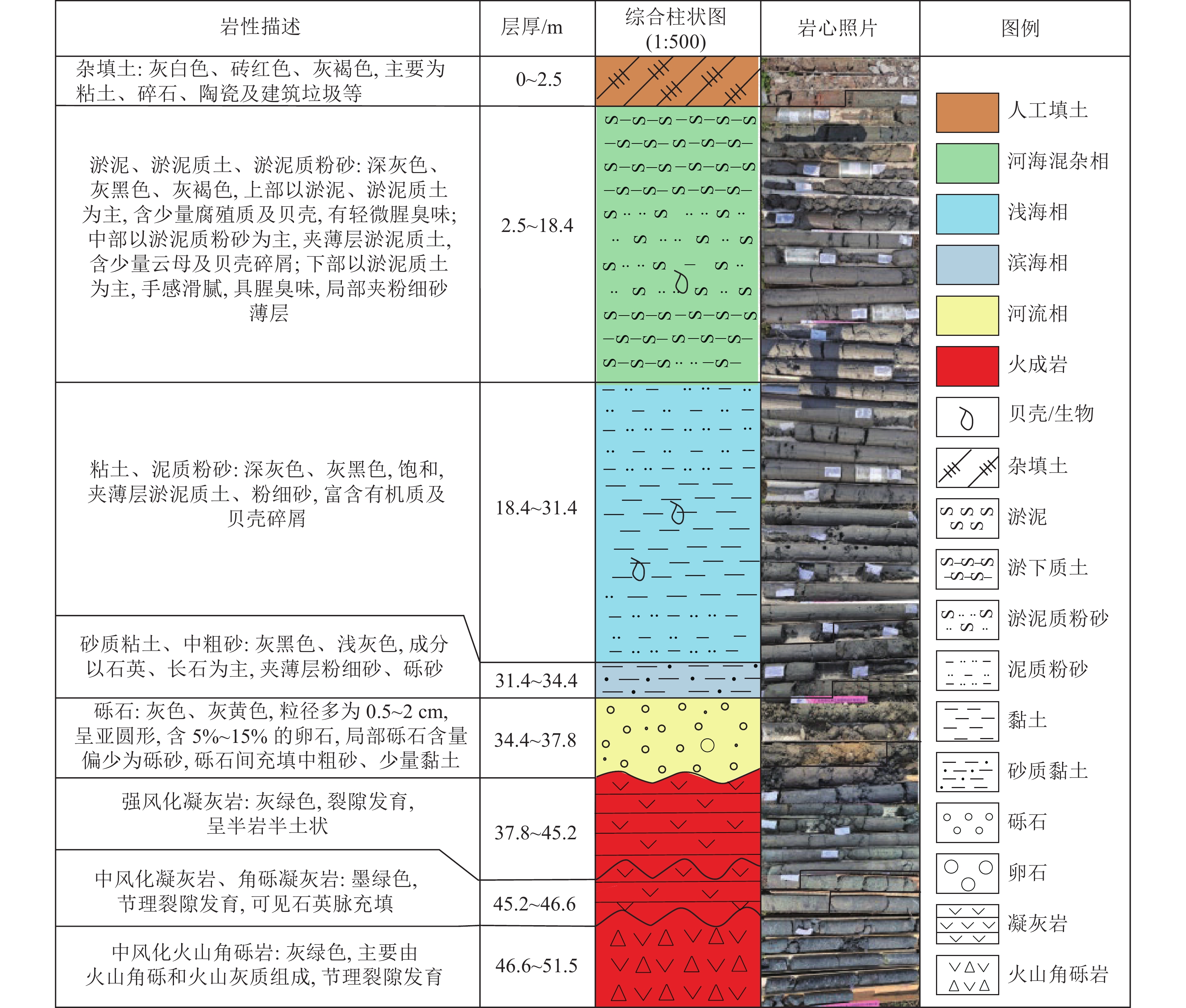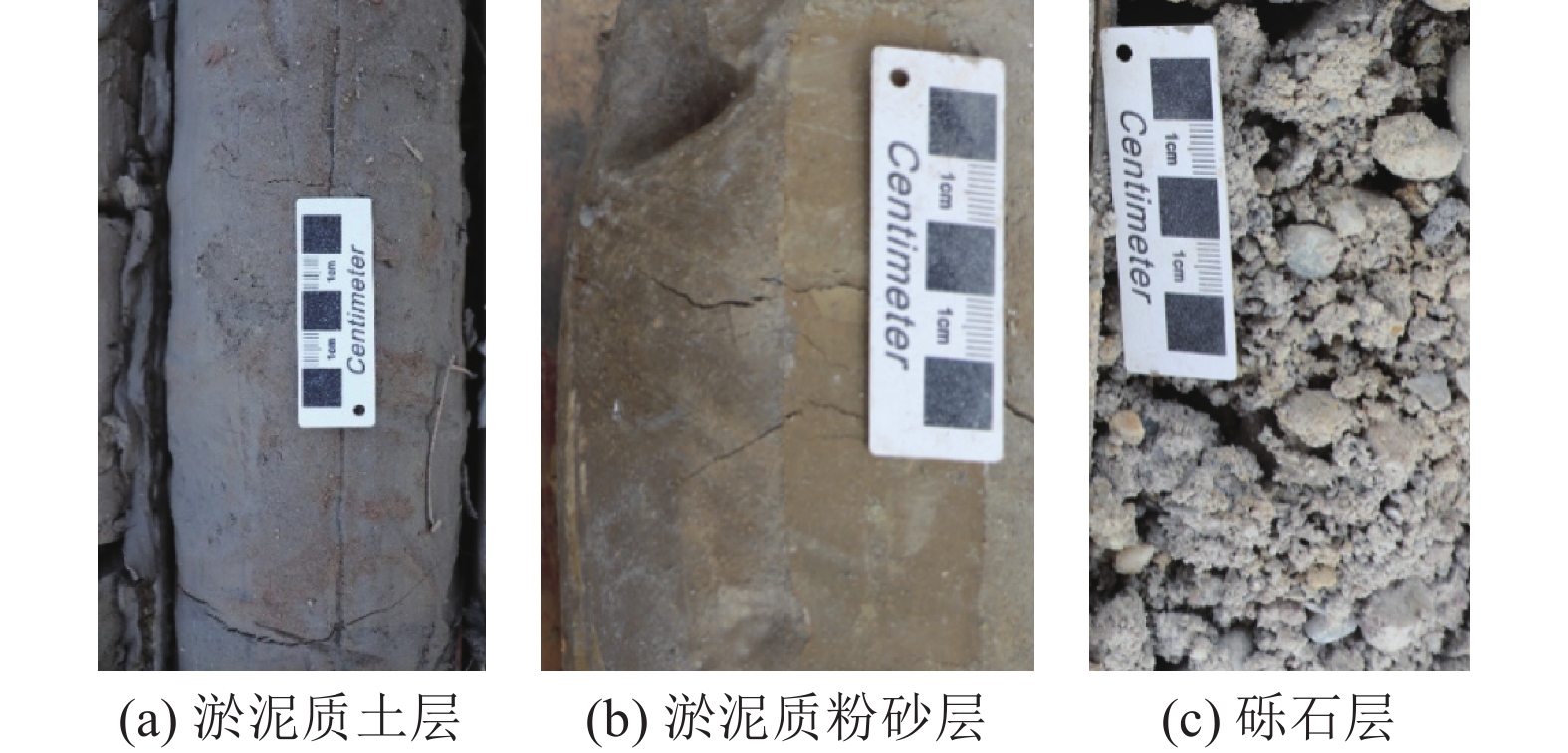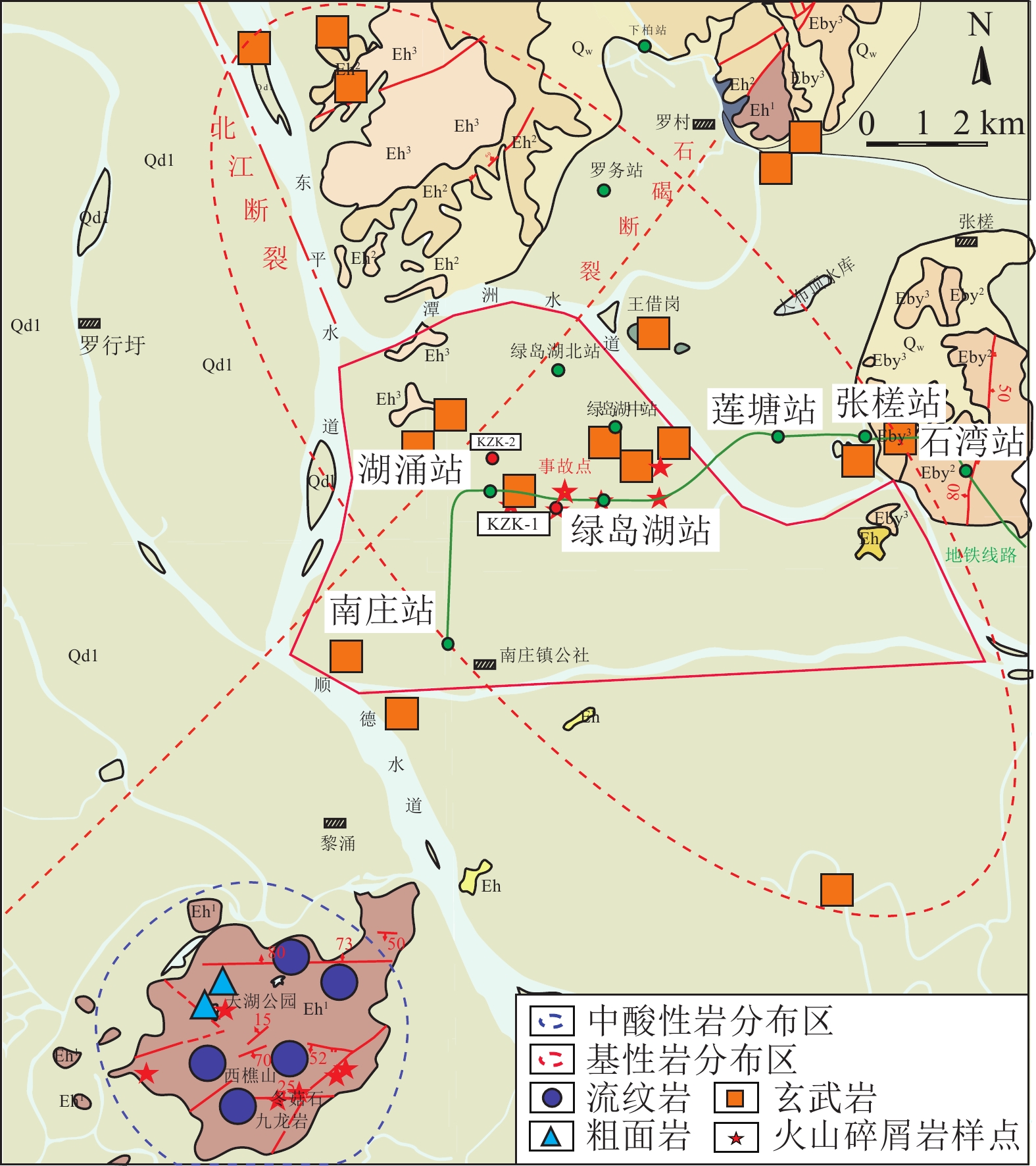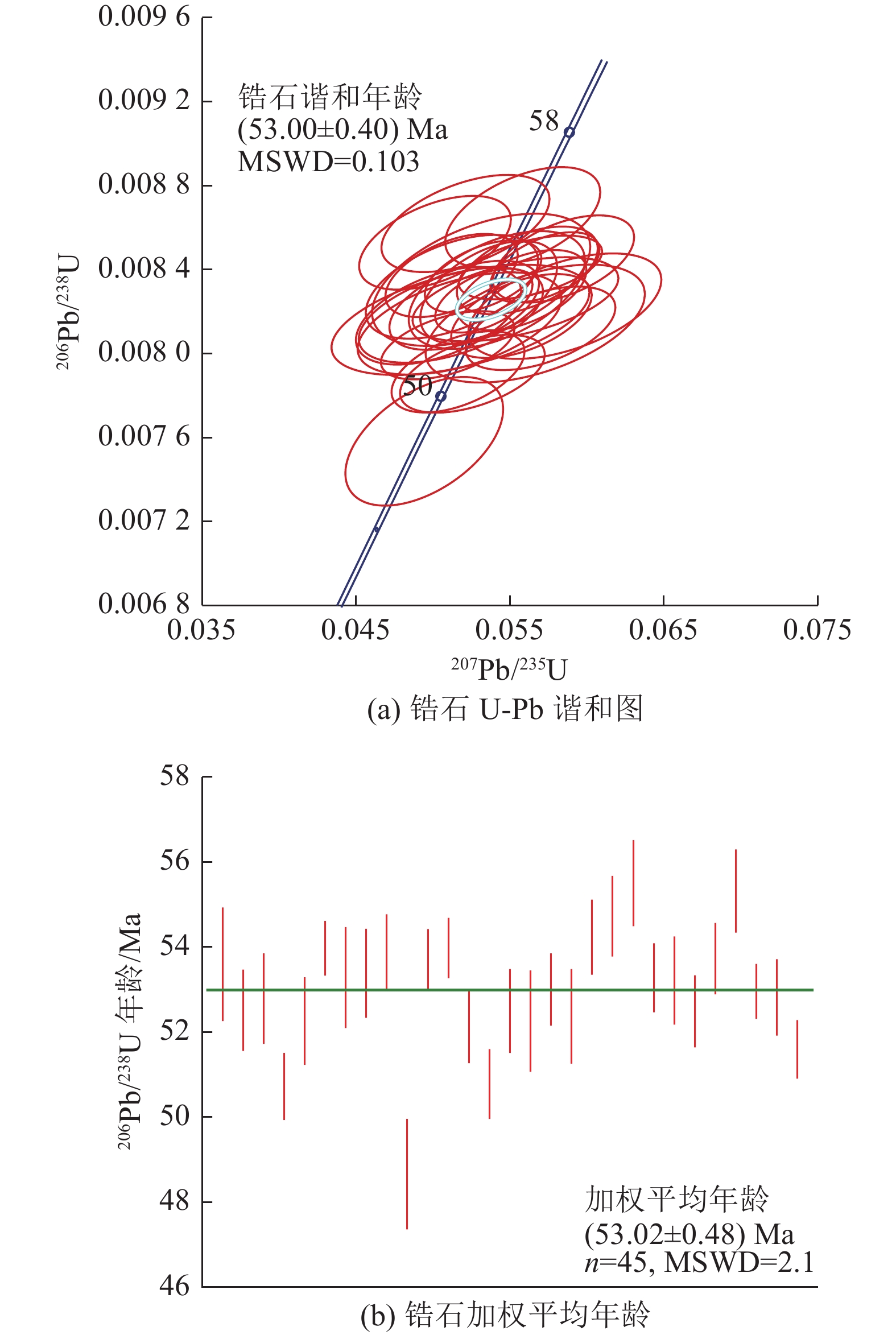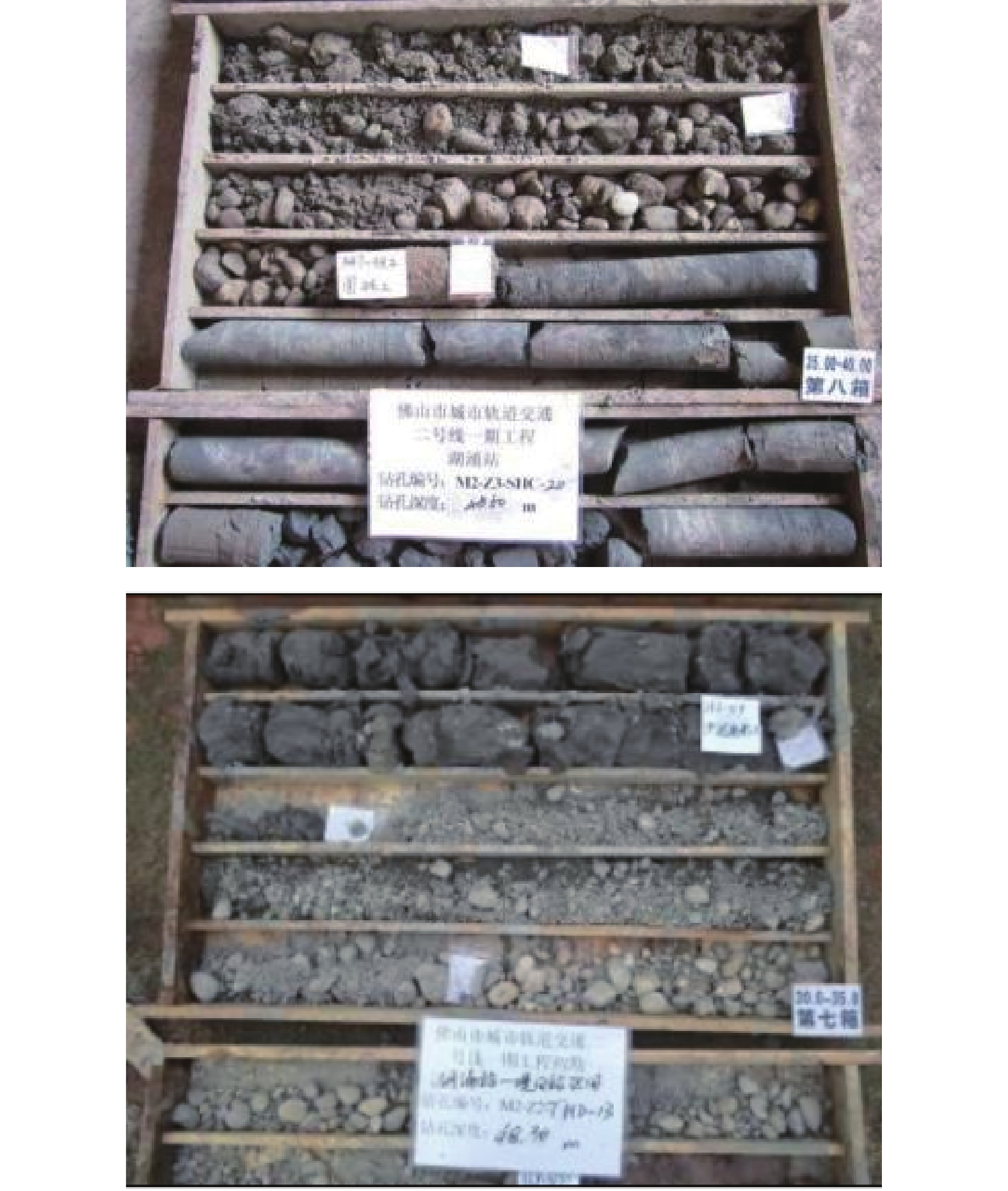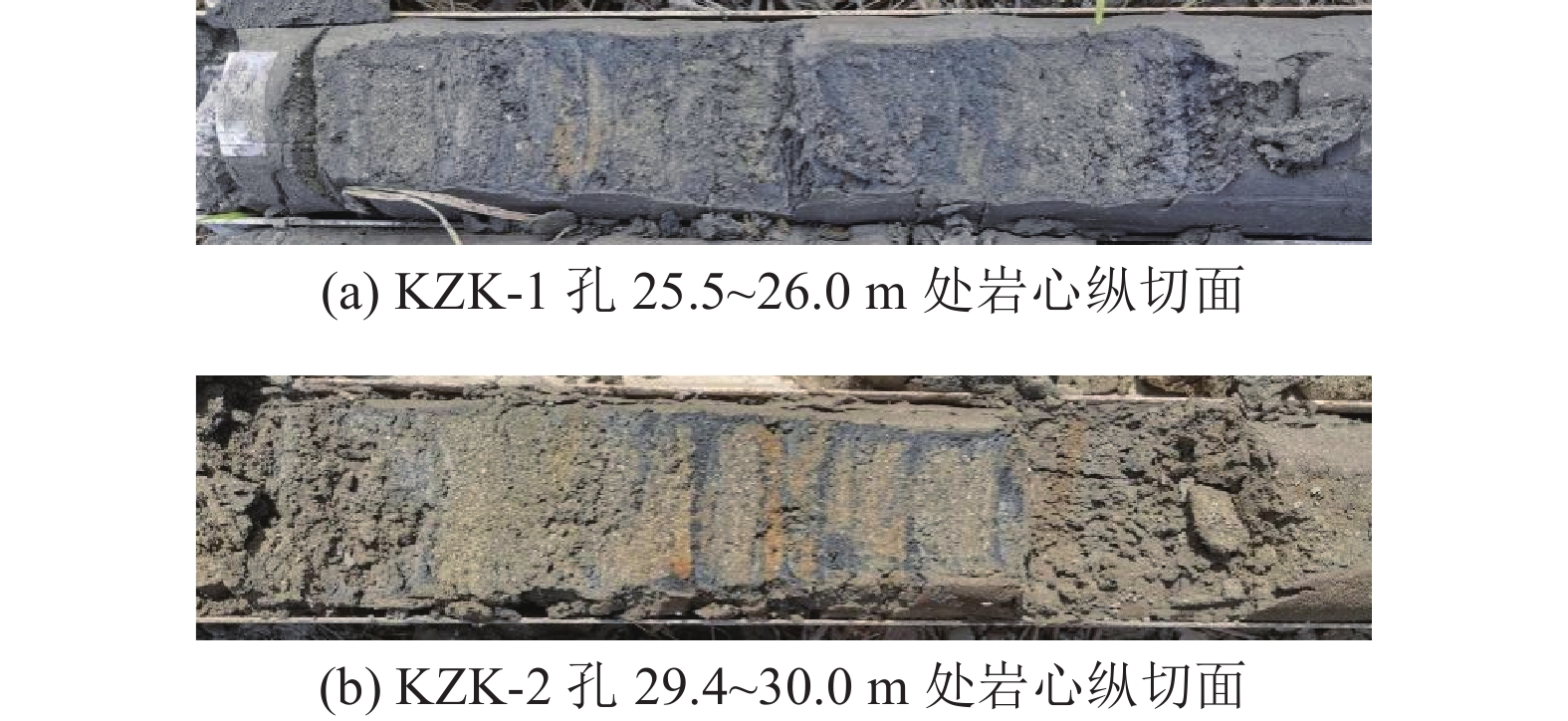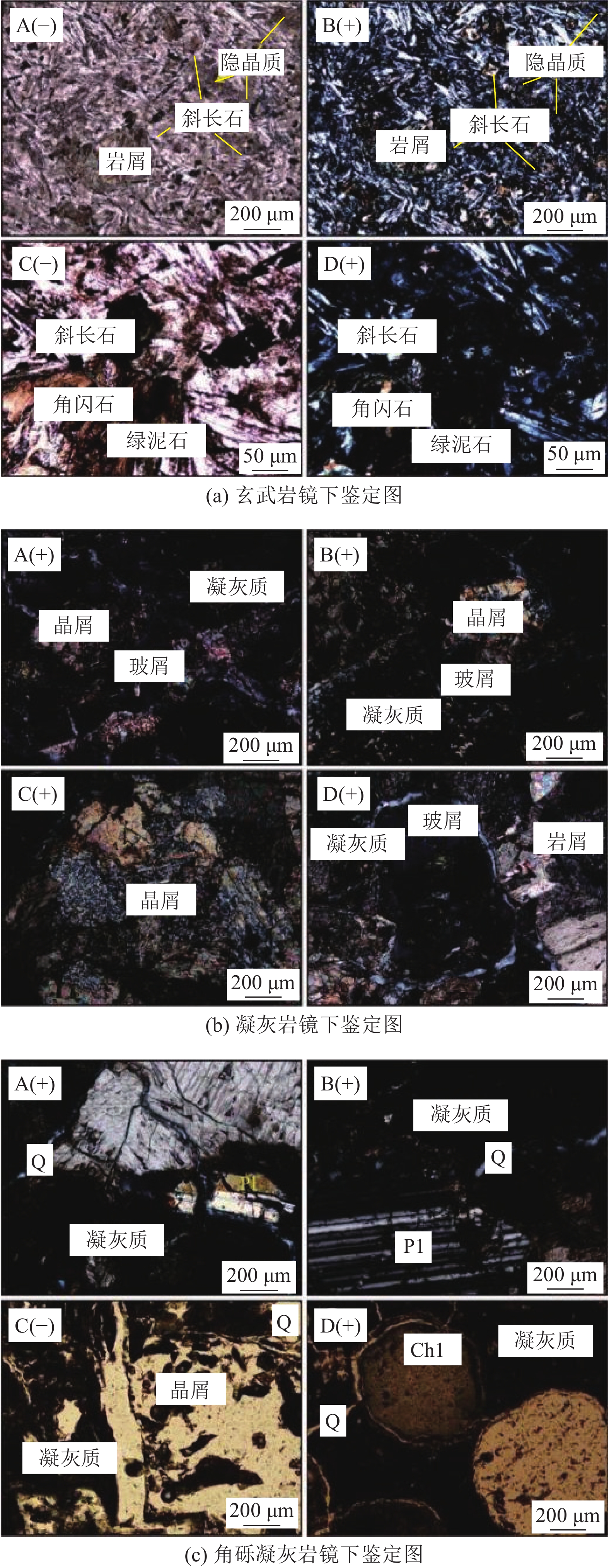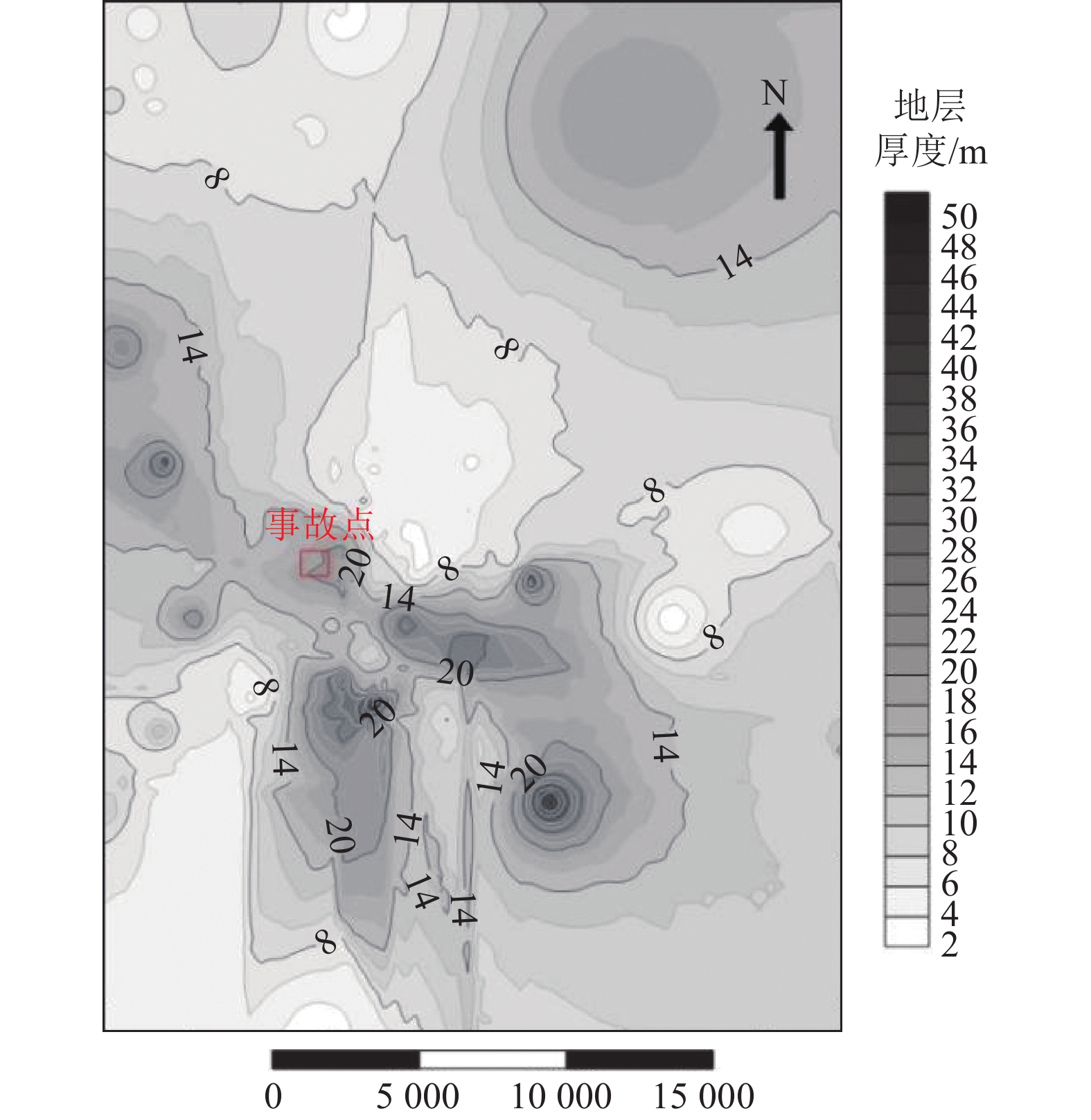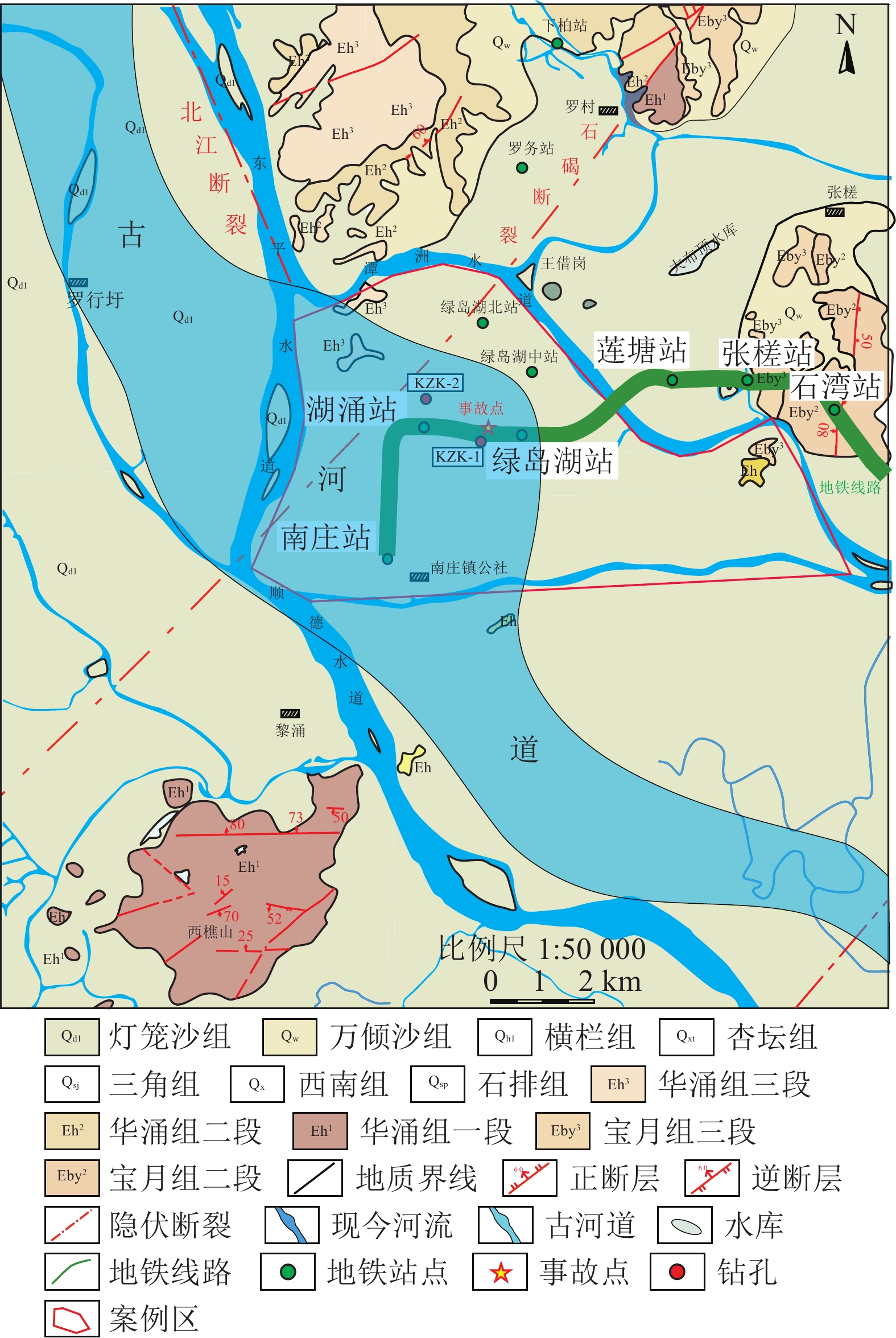Research on main geological factors controlling water gushing and sand gushing of underground engineering in water-rich sand layer
-
摘要:
沿海沿江地区地下工程建设中钻遇富水砂层地段,极易产生突发性透水涌泥涌砂,导致地面塌陷、隧道掩埋、基坑坍塌等事故发生。以某市轨道交通盾构区间透水事故为例,在收集工程事故资料的基础上,结合区域地质背景、大量钻孔数据、野外勘查、现场试验及室内测试结果综合分析,研究此事故背景中各重要地质因素的作用方式,明确引发事故的主控地质因素。结果表明:研究区地质背景复杂,第四纪沉积广泛发育,分布不均,沉积产物复杂多样,地下水位高,水量丰富,上覆淤泥、淤泥质土等不透水层而多具承压性,高水头压力下复合地层稳定性差,持续的渗流侵蚀易产生涌水通道,引发地层结构失稳。基底钻遇的华涌组火山岩节理裂隙发育,透水性弱~强,富水性中等~好,富水性和渗透性变化较大,基岩水发育具有非均一性,不同岩性及风化程度对施工的影响具有差异性。地下揭露的古河道与现今河网发育具有重叠性,东平水道主干河道表现出较高的稳定性和继承性,沿古河道分布有中等~强透水性的砂砾石、卵石层,赋存的深层承压水与基岩水之间大部分区域不存在隔水层,局部与地表水体连通,各种类型水水量交换顺畅,地下水补给方式多样,水文地质条件复杂。上述均为易引发富水砂层涌水涌砂的不良地质条件,尤其是古河道分布发育和复合地层沉积组合2个主控因素,在后续类似地质条件的地下工程建设中需进行重点防控。
Abstract:When encountering water rich sand layers during underground engineering construction in coastal and riverside areas, it is very easy to cause sudden water permeability, mud gushing and sand gushing,causing accidents such as ground collapse, tunnel burial, foundation pit collapse. Taking the water leakage accident in a shield tunnel section of a certain urban rail transit as an example, based on the collection of engineering accident data, combined with the comprehensive analysis of regional geological background, a large number of drilling data, field exploration, field testing and indoor testing results, study the action mode of various important geological factors under the background of the accident,and identify the main control geological factors causing the accident. The geological background of study area is complex, the Quaternary sediments are widely developed and unevenly distributed, with complex and diverse sedimentary products. The groundwater level is high and the groundwater quantity is rich. The groundwater covering with impermeable layers such as silt and muddy soil are mostly under pressure. The stability of composite formation under high water pressure is poor, and the continuous seepage erosion is prone to generating water inrush channels leading to instability of the geological structure. The volcanic rock joints and fissures of the Huachong Formation drilled in the basement are developed, with weak to strong water permeability, medium to good water abundance, and large changes in water abundance and permeability. The development of bedrock water is heterogeneous, and the impact of different lithology and weathering degree on construction varies. The ancient river channels exposed underground are overlapped with the current river network development. The main river channel of Dongping Waterway shows high stability and inheritance. There are medium-strong permeable sand gravel and pebble layers distributed along the ancient river channel. Most areas between the deep confined water and bedrock water do not have an water-resisting layer, and the part of deep confined water is connected with surface water. The exchange of various types of water is smooth. There are various ways of groundwater recharge, and the hydrogeological conditions are complex. The above are the unfavorable geological background factors that are easy to cause water gushing and sand gushing in the water-rich sand layer, especially the formation and distribution of ancient river channels and the development of composite strata sedimentation, which need to be focused on prevention and control in the subsequent underground engineering construction with similar geological conditions.
-
-
表 1 研究区第四系地层渗透系数统计
Table 1 Statistics of permeability coefficient of Quaternary strata in the study area
序号 试验
地层工点 渗透系数K/(m·d−1) 渗透性
等级水文试验 室内试验 1 淤泥、淤泥质土层 湖涌停车场出入线 — 0.000 1 不透水 湖涌站 — 0.000 12 不透水 绿岛湖站 — 0.000 06 不透水 2 淤泥质粉砂(土)层 湖涌站~绿岛湖站区间 — 0.000 1 不透水 湖涌站 — 0.038 弱透水 3 粉细砂层 南庄站 1.276 — 中等透水 南庄站~湖涌站区间 1.616 — 中等透水 南庄站~湖涌站区间 1.248 — 中等透水 4 中粗砂及圆砾层 南庄站 5.770 — 中等透水 南庄站~湖涌站区间 7.856 — 中等透水 湖涌站~绿岛湖站区间 8.463 — 中等透水 13.203 — 强透水 绿岛湖站 8.140 — 中等透水 湖涌站~绿岛湖站区间事故案例区 7.530 — 中等透水 注:含水层的透水性判别标准选用《城市轨道交通岩土工程勘察规范》(GB 50307—2012)。 表 2 研究区基岩水文地质试验结果统计
Table 2 Statistics of bedrock hydrogeological test results in the study area
序号 工程 抽水试验地层 抽水试验渗透系数K/(m·d−1) 渗透等级 1 湖涌站~绿岛湖站区间事故案例地质背景研究 强、中风化火山岩 0.378 弱透水 2 湖涌站详勘阶段工程勘察 强风化泥质砂岩、砂岩 0.124 弱透水 -
[1] 曲腾飞,王 媛. 软土地层中地铁隧道透水事故处理及修复工艺[J]. 都市快轨交通,2017,30(1):82−86. QU Tengfei,WANG Yuan. Permeable accident treatment and repair technology for subway tunnel in soft soil stratum[J]. Urban Rapid Transit,2017,30(1):82−86.
[2] 姚志刚,郭建宁,方 勇,等. 强透水砂卵石地层泥水盾构掌子面塌方处理措施研究[J]. 施工技术,2017,46(13):119−122. YAO Zhigang,GUO Jianning,FANG Yong,et al. Study on treatment measures for face collapse of slurry shield in strong permeable sandy cobble stratum[J]. Construction Technology,2017,46(13):119−122.
[3] 苏秀婷. 青岛地铁富水砂层隧道开挖施工风险与变形规律研究[D]. 青岛: 中国海洋大学, 2012. SU Xiuting Research of tunnel excavation risk and settlement in water-enriched sand layers of Qingdao metro[D]. Qingdao: Ocean University of China, 2012.
[4] 秦新春. 隧道盾构开挖事故统计与开挖过程数值模拟[D]. 廊坊: 防灾科技学院, 2020. QIN Xinchun. Statistics of tunnel shield excavation accidents and numerical simulation of excavation process[D]. Langfang: Institute of Disaster Prevention, 2020.
[5] 尹建滨,范士凯,陶宏亮等. 降水疏干法处理高承压含水层突涌事故的辨析−以武汉地铁复兴门站盾构突涌事故为例[J]. 四川建材,2016,42(8):121−123. YIN Jianbin,FAN Shikai,TAO Hongliang,et al. Analysis on the treatment of sudden surge accidents in high pressure aquifers using precipitation and drainage method: taking the shield tunnel surge accident at Fuxingmen station of Wuhan metro as an example[J]. Sichuan Building Materials,2016,42(8):121−123.
[6] 陈孟乔. 高水压砂土地层中泥水盾构隧道开挖面失稳机理与风险评估研究[D]. 北京: 北京交通大学, 2014. CHEN Mengqiao. Study on instability mechanism and risk assessment of slurry shield tunneling face in sands under high hydraulic pressure[D]. Beijing: Beijing Jiaotong University, 2014.
[7] 曾一凡,武 强,赵苏启,等. 我国煤矿水害事故特征、致因与防治对策[J]. 煤炭科学技术,2023,51(7):1−14. ZENG Yifan,WU Qiang,ZHAO Suqi,et al. Characteristics, causes, and prevention measures of coal mine water hazard accidents in China[J]. Coal Science and Technology,2023,51(7):1−14.
[8] 黄学军,杨艳玲. 南昌地铁泥水盾构穿越赣江风险分析及其控制措施[J]. 公路交通技术,2016,32(2):112−116. HUANG Xuejun,YANG Yanling. Analysis for risks of slurry shield in Nanchang metro crossing Ganjiang River and control measures[J]. Technology of Highway and Transport,2016,32(2):112−116.
[9] 李希元,闫静雅,孙艳萍. 盾构隧道施工工程事故的原因与对策[J]. 地下空间与工程学报,2005(6):968−971. LI Xiyuan,YAN Jingya,SUN Yanping. Causes and countermeasures of shield tunnel construction accidents[J]. Chinese Journal of Underground Space and Engineering,2005(6):968−971.
[10] 张瑾. 青岛富水砂层隧道变形机理及其控制对策研究[D]. 北京: 中国矿业大学(北京), 2013. ZHANG Jin. Deformation mechanism and its control strategy for water-rich sand stratum in tunnels of Qingdao[D]. Beijing: China University of Mining and Technology, 2013.
[11] 陈帆, 王迎超, 郑顺华. 地铁隧道涌水涌砂诱发地面塌陷的大型模型试验研究[J/OL]. 土木工程学报: 1−11[3-08-09]. DOI: 10.15951/j.tmgcxb.22060564. CHEN Fan, WANG Yingchao, ZHENG Shunhua. Large scale model experiment of ground collapse induced by water and sand gushing in subway[J/OL]. China Civil Engineering Journal: 1−11[2023-08-09]. DOI: 10.15951/j.tmgcxb.22060564.
[12] 罗俊兴. 高富水砂层中地下工程涌水涌砂引起的土体渗流侵蚀试验研究[D]. 广州: 华南理工大学, 2020. LUO Junxing. Experimental study on internal erosion caused by water gushing and sand gushing of underground engineering in high water-rich sand layer[D]. Guangzhou: South China University of Technology, 2020.
[13] 杨伟彬,何 斌,尼玛央金,等. 珠江三角洲中南部第四系沉积特征和古河道变迁[J]. 化工矿产地质,2022,44(4):328−334. Yang Weibin,HE Bin,NIma Yangjin,et al. Quaternary sedimentary characteristics and palaeo-channel evolution in the central and southern Pearl River Delta[J]. Geology of Chemical Minerals,2022,44(4):328−334.
[14] 万语. 珠江三角洲南沙地区第四系特征与活动断裂分析[D]. 北京: 中国地质大学(北京), 2021. WANG Yu. Characteristics of the Quaternary Stratigraphy and Quaternary active faults in the Nansha area of the Pearl River Delta[D]. Beijing: China University of Geosciences (Beijing ), 2021.
[15] 陈盼盼. 三水盆地晚白垩世—始新世火山—沉积序列对南海北缘构造演化的响应[D]. 北京: 中国地质大学(北京), 2018. CHEN Panpan. The response of Late Cretaceous-Eocene volcano and sedimentary sequence in Sanshui Basin to the tectonic evolution of the northern margin of South China Sea[D]. Beijing: China University of Geosciences (Beijing), 2018.
[16] 张纯一. 三水盆地古近系碎屑沉积及其对南海陆内裂谷阶段的反映[D]. 北京: 中国地质大学(北京), 2017. ZHANG Chunyi. Paleogene clastic deposits of Sanshui Basin and their response to the continental rift stage of the South China Sea[D]. Beijing: China University of Geosciences, 2017.
[17] CHEN Peijia,FANG Nianqiao,YUAN Xiaobo. Geochemical insights from clinopyroxene phenocrysts into the magma evolution of an alkaline magmatic system from the Sanshui Basin, South China[J]. Minerals,2021,11(11):1295. doi: 10.3390/min11111295
[18] 张 煜,方念乔. 广东三水盆地玄武岩源区特征与南海早期演化[J]. 海洋地质与第四纪地质,2021,41(3):95−113. ZHANG Yu,FANG Nianqiao. Source characteristics of basalts in Sanshui Basin and the early tectonic evolution stage of the South China Sea[J]. Marine Geology & Quaternary Geology,2021,41(3):95−113.
[19] 孙和平. 三水盆地西樵山火山岩研究[D]. 北京: 中国地质大学(北京), 2019. SUN Heping. Research on Xiqiaoshan volcanic rocks in Sanshui Basin[D]. Beijing: China University of Geosciences, 2019.
[20] 黄 畅,王永红,杨清书,等. 珠江三角洲河网流量的时空变化及影响因素[J]. 中国海洋大学学报(自然科学版),2022,52(5):97−106. HUANG Chang,WANG Yonghong,YANG Qingshu,et al. Spatiotemporal variation of discharge and its influencing factors in the Pearl River Delta network area[J]. Periodical of Ocean University of China,2022,52(5):97−106.
[21] 张周良,王芳华. 广东三水盆地第四纪网状河沉积特征[J]. 沉积学报,1997(4):60−65. ZHANG Zhouliang,WANG Fanghua. Sedimentary of Quaternary anastomosing river systems in the Sanshui Basin, Guangdong, China[J]. Acta Sedimentologica Sinica,1997(4):60−65.
[22] 王晓静. 珠江三角洲晚第四纪沉积环境与古气候研究[D]. 广州: 中山大学, 2010. WANG Xiaojing. Late Quaternary sedimentary environment and paleoclimate of Pearl River Delta[D]. Guangzhou: Sun Yat-sen University, 2010.
[23] 竺维彬, 鞠世健, 王晖, 等. 复合地层中的盾构施工技术[M]. 北京: 中国建筑工业出版社, 2020. [24] 韦 惺,吴超羽. 珠江三角洲沉积体与河网干流河道的形成发育[J]. 海 洋学报,2018,40(7):66−78. WEI Xing,WU Chaoyu. The formation and development of the deposition bodies and main channels in the Zhujiang River Delta[J]. Haiyang Xuebao,2018,40(7):66−78.
[25] 时硕. 珠江三角洲顺德平原全新世沉积环境演变及人类活动记录[D]. 上海: 华东师范大学, 2022. SHI Shuo. Holocene depositional environment evolution and human activity records in the Shunde Plain, Pearl River Delta[D]. Shanghai: East China Normal University, 2022.




 下载:
下载:
